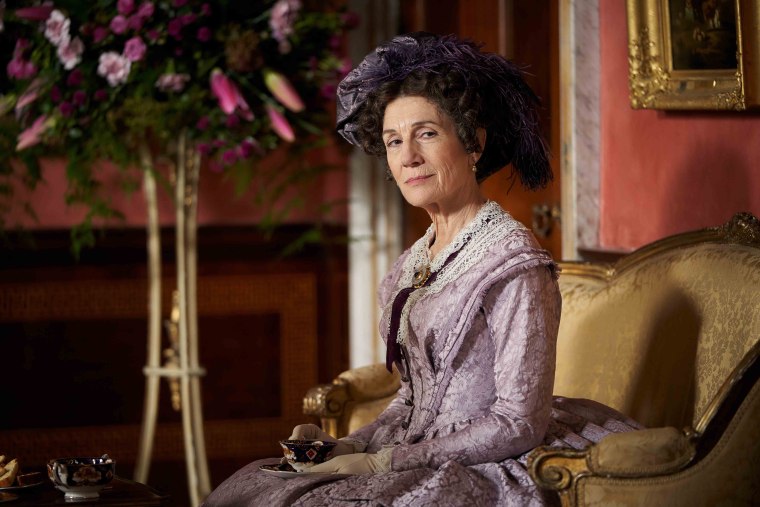When “Downton Abbey” premiered on PBS in 2011, it was not expected to become an American phenomenon. And yet this historical drama set in the Edwardian era captivated audiences across the pond; its spinoff film even became a number one hit at the box office last September. With such a devoted following, it’s no surprise that “Downton” creator Julian Fellowes has now released two new series. (Although the fact that they premiered barely three weeks apart is a bit unusual.) “The English Game” arrived on Netflix on March 20, just in time to be buried in an avalanche of COVID-19 news. Now comes “Belgravia,” premiering on Epix. Netflix is the larger streamer, it’s the latter show that will appeal to the “Downton” fan.
“The English Game” arrived on Netflix on March 20, just in time to be buried in an avalanche of COVID-19 news. Now comes “Belgravia,” premiering on Epix.
“Belgravia” is inarguably the better of the two. Based on a 2016 novel of the same name, which just so happens to have been penned by Fellowes, it follows a similar strategy as “Downton.” In this case, history is retold through the story of the fictional Trenchards, a middle-class family quietly making a fortune as the main supplier to the British armed forces during the Napoleonic Wars. Head of the family James (Philip Glenister) is regularly referred to as “The Magician” by the titled nobility who understand that an army moves on its stomach. Both father and daughter Sophia (Emily Reid), have high aspirations. Only mother Anne (Tamsin Greig) the heroine of the piece, understands how little the nobility actually respects them.
The story begins the night before Waterloo and then moves forward 25 years to 1840s London, in the Belgravia district. Miraculously, it manages not to fall prey to the stereotypical mid-century Victorian tropes. (If only PBS’ “Victoria” had been so lucky.)
Fellowes also returns to the “Downton” well for plot inspiration. The Trenchard’s daughter is tricked into having sex with a high class lord — which leads to a baby out of wedlock — echoing the dead lord in Lady Mary’s bed in “Downton Abbey’s” first season. (And both draw from whispered scandals of old.)
Where Fellowes breaks from “Downton,” however, is in tone. Where nothing bad ever really happened to the Granthams (unless an actor decided to exit the series) happy endings do not extend to those in Belgravia.
“Belgravia” also leans hard on Fellowes’ love of older female heroines. Anne soon finds herself in a friendship with Lady Brockenhurst (Harriet Walter). The series really takes off when it focuses on this dynamic. As a portrait of old and new moneyed wives navigating a world rapidly evolving under their feet — yet refusing to budge on social mores — the series is a smashing success. And it’s nice to see a show explore the older set in such a milieu, as so many novels of the period prefer their younger ingenue counterparts. “Belgravia” has little interest in the youths, who are generally portrayed as doe-eyed or snobs whose lack of life experience means they have not learned the power of grace.
It also has little interest in men, who mostly seem to be fools or disappointments. Unfortunately, the same cannot be said for Netflix’s “The English Game,” which attempts to recast the “Downton” mold for men.
“The English Game” purports to tell the story of how a pair of 19th century Scottish footballers named Fergus Suter (Kevin Guthrie) and Jimmy Love (James Harkness) leveled the playing field against upper-class Etonians like Arthur Kinnaird (Edward Holcroft), and how they came together to create the world’s most popular sport as we know it today.
This idea is fine on paper; the creation of football seems ripe for dramatization. It should also fit the Fellowes model, with its upstairs/downstairs dynamic. But Fellowes has a distinct weakness for the mythical idea of the pastoral underclasses, and the condescending attitude that drives this myth is on full display here. Fellowes also doesn’t seem to know how an entire group of people function except in relation to the upper class, so instead of showing their lives, the characters walk around talking about them. In one scene a cotton trader has a conversation with others in his business in which he literally explains cotton trading. “Downton” regularly needed to stage similar scenes when it came to explaining how estates make money. But in “Downton” it felt educational, not awkward.
It also doesn’t help that for a writer who obviously prefers writing for women, this is a series focused almost completely on men. Charlotte Hope, as Kinnaird’s wife, is far more interesting that her football star husband. Too bad the show isn’t about her. But perhaps even more damning than how dull the series makes the men is how dull it makes the sport. This is a series about football, which means they have to play football for long stretches of every episode. And yet somehow the show manages to make every game stereotypical and yet simultaneously tedious.
Not that Fellowes has much time to reflect on his mistakes (and triumphs). He has another show, “The Gilded Age” in development over at HBO, which is expected to arrive next year. One can only hope that Fellowes follows the “Belgravia” model more than he does the “The English Game” going forward.


